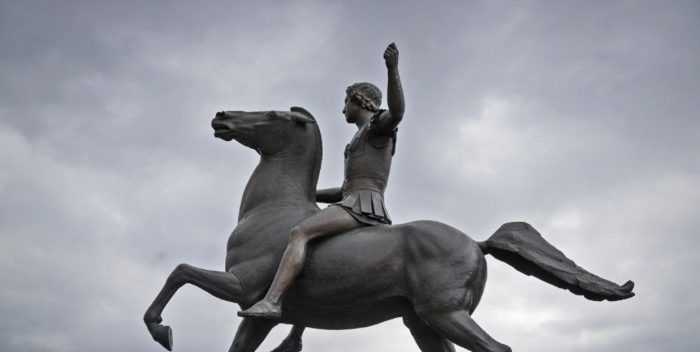Home | Alexander the Great
- CountryGreece
- Town:Athens
-
Year of creation:1973
- Rider(s):Alexander the Great
(356 BC –323 BC), was a king of the ancient Greek kingdom of Macedon. He succeeded his father Philip II to the throne at the age of 20 and spent most of his ruling years on an unprecedented military campaign through western Asia and northeast Africa, and by the age of thirty, he had created one of the largest empires of the ancient world, stretching from Greece to northwestern India. He was undefeated in battle and is widely considered one of history’s most successful military commanders.
During his youth, Alexander was tutored by Aristotle until age 16. After Philip’s assassination in 336 BC, he succeeded his father to the throne and inherited a strong kingdom and an experienced army. Alexander was awarded the generalship of Greece and used this authority to launch his father’s pan-Hellenic project to lead the Greeks in the conquest of Persia. In 334 BC, he invaded the Persian Empire and began a series of campaigns that lasted 10 years. He overthrew Persian King Darius III and conquered the his empire in its entirety. At that point, his empire stretched from the Adriatic Sea to the Beas River.
Alexander endeavoured to reach the “ends of the world and the Great Outer Sea” and invaded India in 326 BC, winning an important victory over the Pauravas at the Battle of the Hydaspes. He eventually turned back at the demand of his homesick troops, dying in Babylon in 323 BC. In the years following his death, a series of civil wars tore his empire apart.
He founded some twenty cities that bore his name, most notably Alexandria in Egypt. Alexander’s settlement of Greek colonists and the resulting spread of Greek culture in the east resulted in a new Hellenistic civilization, aspects of which were still evident in the traditions of the Byzantine Empire in the mid-15th century AD and the presence of Greek speakers in central and far eastern Anatolia until the Greek genocide of the 1920s. Alexander became legendary as a classical hero, the measure against which military leaders compared themselves. Military academies throughout the world still teach his tactics. He is often ranked among the most influential people in history.
- Sculptor(s):Pappas, Yannis
(1913 – 2005) was a Greek sculptor
-
Athens on Friday installed its first Alexander the Great statue, a project mired in bureaucratic delays for nearly three decades. According to the city of Athens, it was completed in 1972 and acquired by the state in 1992, at a time of intense nationalist feeling over a bitter name dispute with the newly-independent former Yugoslav Republic of Macedonia. Athens Mayor Giorgos Kaminis insisted Friday the move had “nothing” to do with the Macedonia dispute. “The decision to erect the statue was taken in 2015. This is a mark of the delays of Greek bureaucracy,” Kaminis told AFP. 2019.
Photographer unknown








